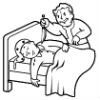
Sztanga
Napisano Ponad rok temu
Chodzicie czasem na silownie oprucz wylewania potu na macie ?
Waszym zdaniem jest cokolwiek potrzebne poza normalnym trenigiem ?
Napisano Ponad rok temu
Oprucz klasycznego treningu na macie, niestety, trza bylo sie wziasc za ciezarki i plywanie. Latka leca i trzeba jakos sobie pomagac :wink: .
Dwa ze cwicze z takimi niedzwiedziami ze sama technika to ja sobie moge... pomachac :wink:
Napisano Ponad rok temu
technika techniką ale dobrze jak jest troszkę podparta
Napisano Ponad rok temu
Na razie figuruję w wadze lekko-półśmiesznej :wink:
Napisano Ponad rok temu
Jesli chodzi o przygotowanie fizyczne w BJJ to liczy sie kondycja (plywanie jest ok) i wytrzymalosc silowa (trening obwodowy na silowni , male ciezary, duzo powtorzen). Typowy trening sily i nie daj Boze masy zwalnia strasznie i powoduje przykurcze (jak ktos sie dodatkowo nie rozciaga), ktore uniemozliwaja taka mobilnosc jaka chcielibysmy miec na macie.
Hast: I co? Chcesz bys silniejszy od tych miskow? Od koksow i tak nie bedziesz nigdy silniejszy ile bys nie trenowal na silowni. BE LIKE WATER! "Pomachaj" wiecej nad technika ;-) (u mnie sprawdzaja sie przetoczenia, nawet na 130kg gosciu)
Napisano Ponad rok temu
Moim najwiekszym problemem podczas sparingow jest brak (1) wytrzymalosci, (2) sily. Doszedlem do wniosku, ze z tego powodu nie jestem w stanie sie prawidlowo rozwijac - zwyczajnie po godzinie sparingow mam mdlosci ze zmeczenia i nie moge dalej cwiczyc.
Przypuscmy, ze trenuje 4 razy w tygodniu.
Czy powinienem czesc z treningow zastapic basenem lub silownia? W jakim wymiarze? Jedna rzecz, ktora przekonuje mnie na korzysc zmniejszenia ilosci treningow, to ograniczenie ryzyka kontuzji, na czym mi bardzo zalezy.
Dziekuje za odpowiedzi.
Napisano Ponad rok temu
Napisano Ponad rok temu
Nie wyrzucalbym zadnego z treningow. Dodalbym rano silownie 2 razy w tygodniu i 1/2 razy basen (weekend?)
Napisano Ponad rok temu
Napisano Ponad rok temu
[link widoczny dla zalogowanych Użytkowników]
[link widoczny dla zalogowanych Użytkowników]
[link widoczny dla zalogowanych Użytkowników]
Napisano Ponad rok temu
[link widoczny dla zalogowanych Użytkowników]
Basic Weightlifting for Martial arts
In the not-so-distant past weight training was discouraged for martial artists. "It will make you slow", "it will make you muscle-bound", and "all you need is technique" were common opinions from the 'experts'.
Times have changed! Athletes in almost every sport lift weights now. Coaches and trainers recognize that it will make their athletes stronger, faster, and more resilient to injury. It is now understood that weight training complements and improves good technique.
Below I have listed some important tips, tricks and guidelines for those grapplers and martial artists thinking about adding weight lifting to their training. These are BASIC tips, geared towards a BEGINNING weightlifter. These are not geared towards powerlifters, Olympic lifters, bodybuilders, etc., all of whom require specialized training.
Warm up for 10 to 15 minutes on the treadmill, stairmaster, etc. Heading straight for the weights without warming up is a good way to get injured, ESPECIALLY in cold climates. If your main goal is strength development then only go hard enough to break a light sweat. If your main goal is to build strength and endurance then go as hard as you can.
Exercise selection: push something off your body (e.g. bench press), pull something towards your body (e.g. pull-ups), bend your arms (e.g. dumbbell curls), straighten your arms (e.g. dips), push something away with your legs (e.g. squat), bend your legs (e.g. hamstring curl), work your calves (e.g. calf raises), bend your body forward (crunches), bend your body backwards (e.g. hyperextensions). You DON"T need to do three different exercises for your biceps when starting out.
Do at least one 'warmup' set for each exercise, followed by two to three 'working' sets.
Do your heaviest, hardest exercises early in the workout. Do squats before leg curls, do pull-ups before bicep curls.
The squat is one of the most important exercises for overall strength development, but make sure that your form is good. Don't let the knees wobble, don't let the ass come up before the head, make sure that you can go down with your knees somewhere between 90 degrees bent and thighs parallel (even if you have to go lighter).
Work with 8 to 12 repetitions per set. Stay at a given weight until you can do more than 12 repetitions, then increase the weight so that you can do only 8. Now stay at this weight until you can do 12 repetitions with it
Unless you are injured use free weights instead of machines. You won't be able to use as much weight in a free squat as you will using a smith machine or leg press machine, but you will build functional strength faster
Stay well hydrated before, during and after your workout by drinking water or sports drinks to avoid cramping and muscle tears
Eat a small snack containing some carbs before you go workout to keep your energy levels up.
Make sure you eat some carbs and protein within an hour of finishing your workout - this will help you recover faster
Limit your workouts to one hour or less - workouts longer than one hour tend to break you down rather than build you up
Lifting weights once a week is good for maintaining strength; lift two or three times a week to make advances
Be wary of the training routines in the bodybuilding magazines. They reflect the workouts of bodybuilders who are soaked in steroids and have been lifting for decades. They do not apply to the beginning weightlifter.
Be wary of supplement advice you receive from the bodybuilding magazines and supplement stores. These businesses exist to sell gullible people the latest, greatest supplement. Protein powder works. Creatine works. Not much else works
To get strong you have to train hard, but also eat well and rest well. If you neglect one of these aspects you will either stall in your training or get injured.
Weightlifting does not mean becoming inflexible - you will maintain your flexibility if you continue to stretch.
Expect rapid strength gains initially. Most people will become up to 40% stronger initially as their nervous system adapts to the stress of lifting. After this your progress will slow down a bit and most strength gains will result from actual growth of muscle.
If you strain the same muscle or body part day after day it will get weaker, not stronger, and eventually get injured. Don't work a body part until it is no longer sore from your last workout.
If you are new to lifting weights stick with slow, controlled movements. Plyometrics, Olympic lifts and other rapid movements are appropriate only once your strength base is established.
Bardzo ciekawe topic'i podane przez JanuszaP.
Dzieki wszystkim.
Napisano Ponad rok temu
pozdrawiam
Napisano Ponad rok temu
Napisano Ponad rok temu
ja dopiero zacynam chodzic na silownie
tak sobie raz w tyg. do szkoly
hehe... ile bierzecie na klate?:> ja samym gryfem macham
(20kg ma...
) tylko sie tu ze mnie nie smiac



pozdrawiam
NIe jest zle.
Znam lepka, ktory jak zrobi trenig samym gryfem to ma na drugi dzien zakwasy.
Napisano Ponad rok temu
Napisano Ponad rok temu
Napisano Ponad rok temu
sila i masa jest niczym w bjj(dla niewiezacych polecam bustamante vs tom erickson-old school fight)
sile i kondycje lepiej sobie wyrobisz pompkami,podciagnieciami plywaniem i calym tym innym cardio wymyslem
no fakt ze fajnie jest wzbudzac respekt wygladem(ale to tylko wyglad)
(kurde chce moja fotka z hojlerem zaszpanowac)

Napisano Ponad rok temu
Użytkownicy przeglądający ten temat: 1
0 użytkowników, 1 gości, 0 anonimowych
 FaceBook
FaceBook
10 następnych tematów
-
 Nic śmiesznego
Nic śmiesznego- Ponad rok temu
-
 pytanie do bjj lublin
pytanie do bjj lublin- Ponad rok temu
-
 Kolana
Kolana- Ponad rok temu
-
 zaproszenie :)
zaproszenie :)- Ponad rok temu
-
 Przerwanie gardy ???
Przerwanie gardy ???- Ponad rok temu
-
 Pytanko:]
Pytanko:]- Ponad rok temu
-
 :))))))))))))))))))
:))))))))))))))))))- Ponad rok temu
-
 BIELSKO BIAŁA
BIELSKO BIAŁA- Ponad rok temu
-
 HUZAR CUP - Open Submission Tournament
HUZAR CUP - Open Submission Tournament- Ponad rok temu
-
 dodatek "walki w klatce"
dodatek "walki w klatce"- Ponad rok temu











